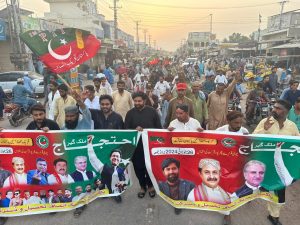According to behavioral scientist Abraham Maslow’s law of the instrument, “if your only tool is a hammer, every problem looks like a nail.” The Pakistan Army Spokesperson Lt. General Ahmed Sharif’s characterization of the Pakistan Tehreek-e-Insaf (PTI)’s social media critique against the institution as “digital terrorism” during a press conference on July 23 exemplifies the notion of the law of the instrument. Drawing attention to PTI’s misinformation about the army on social media, he said “digital terrorists” were using cell phones, computers, lies and propaganda to impose their will on society “akin to terrorists.”
Thereafter, members of the PTI’s social media team, including PTI Spokesperson Rauf Hassan and Coordinator Ahmed Waqas Janjua, were arrested, for running anti-state propaganda. Furthermore, the Pakistani government is also installing a firewall to control social media, while X, formerly Twitter, remains indefinitely banned in Pakistan.
So what is the concept of “digital terrorism”? The Pakistani military establishment has coined this term after failing to cut the PTI to size despite the massive rigging of the February 8 general elections. Currently, the military is running from pillar to post to keep former prime minister and PTI’s founder Imran Khan in jail as the judiciary has acquitted him in three high-profile cases registered before the February 8 elections. Consequently, the tensions between the judiciary and the military have also climaxed. In his presser, Sharif also complained about the slow progress on cases registered against the May 9 rioters, who carried out attacks on the military’s headquarters and other installations.
“Terrorism” is a label of convenience, “it is a way of distinguishing who is in the wrong.” Terrorism scholar Brian Jenkins noted in 1981 that “Terrorism is what the bad guys do.” At any rate, various states have weaponized counterterrorism laws against political opponents to justify heavy-handed tactics. Terms like “digital terrorism” are coined to frame political opponents as security threats. Thereafter, terrorism is used as an instrument to demonize and stigmatize them and justify violence against them. Furthermore, states manufacture justifications, under the pretext of national interests and security, to muffle their voices and roll back their digital footprints. Such broad definitions of terrorism and blanket (ab)use of anti-terrorism laws can pay short-term tactical dividends but prove to be counterproductive from a long-term strategic perspective. Simply put, there are no security solutions to political challenges.
Rapidly evolving sociopolitical, communication and technological transformations have blurred the lines between acts of crimes and terrorism as well as genuine dissent and mis/disinformation campaigns, rendering their differentiation quite difficult. Still, terrorism is the premeditated use of violence against non-combatants to achieve political or ideological goals. Using this definition as a benchmark, PTI’s anti-military propaganda campaign on social media can be categorized as dis/misinformation campaign to misguide public opinion. At best, it falls under the cybercrimes category, not terrorism.
Likewise, the May 9 violence by PTI activists, including attacks on state installations can be classified as riots or acts of political violence, which can be prosecuted under the Pakistan Penal Code.
Framing political opposition and dissent in Pakistan as “digital terrorism” will have long-term negative consequences not only for Pakistan’s counterterrorism campaign but also for democracy, freedom of opinion, individual liberties and digital rights as well.
First, the ongoing political turmoil in Pakistan is emblematic of the growing state-society gap. The state’s strategy to frame a political challenge as a security threat would weaken its efforts to fight terrorist networks.
The opposition from political parties in Khyber Pakhtunkhwa to the recently announced Azm-e-Istehkam or Resolve for Stability counter-terrorism campaign exemplifies this. They have organized protest rallies under the banner of Aman Pasoon, asking questions about the outcome of previous military offensives. Without public support, it is difficult to achieve success against terrorist networks. Tehreek-e-Taliban Pakistan (TTP) has successfully exploited the growing state-society mistrust by praising the protests against Azm-e-Istehkam.
Second, stifling political dissent through the brazen use of anti-terror laws will be detrimental to Pakistan’s troubled democracy, or whatever is left of it. Though Pakistan has not witnessed a military coup in the last 15 years, The Economist Intelligence Unit’s Democracy Index 2023 report has classified Pakistan as an “authoritarian regime,” underscoring the largest deterioration of democracy in any country in Asia. The weakening of democracy against the backdrop of the Taliban’s return to power in Afghanistan and the TTP’s persistent demand for a Taliban-style theocratic rule in Pakistan will strengthen the latter’s anti-democratic propaganda.
Finally, as long as political disputes are not resolved politically, social media discussions and campaigns around them cannot be stopped through blanket bans on platforms like X or the installation of firewalls. Such ill-advised approaches are akin to brushing problems under the carpet. In the digital age, people find innovative and creative ways of getting around blanket bans and firewalls. In fact, it is ironic that the Pakistani government is using Virtual Private Networks (VPNs) to access X in violation of its own policy. Pakistan’s much-touted pivot from geopolitics to geoeconomics based on regional connectivity looks hollow when the country is shutting down major platforms of communication that are central to forging and promoting a healthy business environment in any country.
Unfortunately, the Pakistan security establishment’s strategy to securitize politics has also politicized (internal) security without any substantial damage to PTI.
Pakistan’s counterterrorism campaign is at an inflection point as the state is struggling to maintain its writ in Khyber Pakhtunkhwa’s southern districts. In these areas, the government has asked the local population to stay in their houses after 5 p.m. The military and other security officials also restrict their movement after dark.
While the state and society are divided, three major militant groups TTP, Hafiz Gul Bahadur and Lashkar-e-Islam have bridged their differences and forged alliances for coordinated attacks. Against this backdrop, the state should douse the political fires raging inside the country by offering offramps to the PTI and focus instead on implementing the new counterterrorism campaign to restore its writ.

































